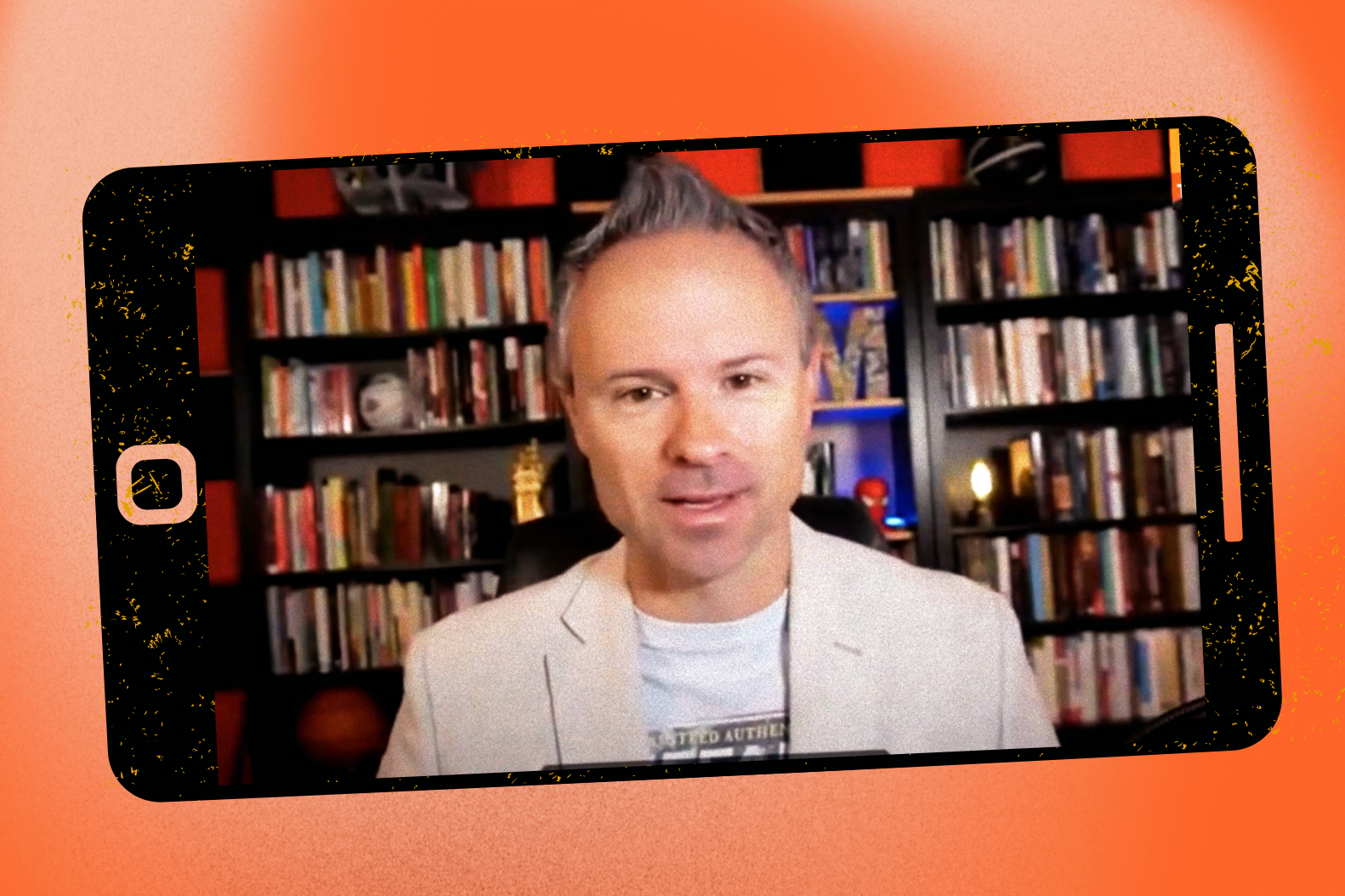Would Jesus even use social media?
Quite obviously, we can’t turn to a passage in one of the gospels in which Jesus uses social media.
But the question is: Are there principles in the gospels and the life of Jesus that would tell us if He might communicate this way?
And if so, how Jesus might communicate? I think there are.
Why would I say such a thing? Well, just look at the way that Jesus communicated.
I thought about writing a whole book on the communication of Jesus because it’s brilliant.
For example, He would go out and preach on a boat to people on the shore. Why? To project his voice.
Jesus would speak on a hill. Why? That also projects his voice.

So if we studied the communication of Jesus, it seems that He was willing to use some of the means and mechanisms that were available to teach, preach and spread the gospel.
While there are a lot of questions about which social medium Jesus might use, I think it’s fair to say that Jesus was eager and willing to be an effective communicator.
Now, how did Jesus communicate? He did a few things.
1. Jesus told stories
Jesus didn’t give three-point sermons. He told stories.
Have you ever really thought about why? Why did He choose to communicate that way?
One reason is we love stories. We are wired in a way, biologically and relationally, to enjoy stories.
Second, we also remember stories. One of my friends, a communication professor at Biola, talked to me about how he did a study.
When people listened to a message, the amount that they remember, say an hour later, 24 hours later, a week later, decreases. But the key things that people remember are stories.
Third, stories rivet us. There’s something about stories that just grab us in.
When I’m speaking and giving a talk, I know that if I get lost in exegesis or a historical point, I can see the audience starting to fade especially if they are students.
I start to tell a story and what happens? It’s like there’s this power, like a force almost, where people will turn and they’ll start to focus.
Fourth, we retell stories. When we hear a good story, we tell it to somebody else.
Just think about your life and the way you’ve communicated in the past day or week. How many stories have you retold from other people? Chances are, quite a few.
And last, stories are persuasive. They change the way we think and see the world.
Jesus was asked the question: Who’s my neighbour? He doesn’t explain: “Hey, your neighbour is ABC.” He tells a story about the Good Samaritan.
When we watch a sermon, we know someone’s preaching to us, so we filter it through the sense that someone’s trying to get a message across.
But if we watch a movie, although it’s filled with messages, what happens? Our defences go down.
Whenever somebody says: “Hey, let me just tell you a story.” What happens? We can be persuaded and influenced.
What’s amazing is on different forms of social media, it’s often times stories.
TikTok videos are quick stories. On Instagram, people tell Stories. People often use YouTube to tell a story.
So when we think about social media, realise that an effective way is to tell stories because that’s how Jesus communicated.
2. Jesus asked a lot of questions
There are over 300 questions recorded.
For example, perhaps one of the most important questions He asked was: “Who do you say I am?”.
Jesus also said, “Why does this generation seek a sign?” and “How can Satan cast out Satan?”.
Even God the Father when He spoke with Adam and Eve asked: “Who told you that you were naked?” He communicated with them through questions.
I think we have good reason to believe that Jesus may have used certain forms of communication such as social media, but He would have been thoughtful and strategic in how he did so.
So how would Jesus actually use social media?

Well, here’s one thing I know. Jesus had a very clear mission statement: He knew who He was, and He knew why He came.
Everything He did — from picking His 12 disciples, where He travelled, the stories He told, the way He communicated — was based on His mission that He came to advance and bring in the kingdom of God.
So my question is: What’s your mission statement for how you want to use social media? What’s your goal?
This helps you when you think about posting something on social media. The question is always: Does this advance my mission or not?
Now for me my primary goal is discipleship, with a secondary goal of evangelism.
I want to disciple Christians to be grounded in their faith, and I want to model for Christians how to treat non-believers and how to have spiritual conversations.
If my primary goal was evangelism, I would probably approach things a little bit differently. I’m not saying one is better than the other. We need both.
But as you think about engaging social media, you might write down a mission statement or at least a bullet point. And I would be specific about my audience: this is somebody in a certain country, of a certain age.
This helps you when you think about posting something on social media.
The question is always: Does this advance my mission or not? If it doesn’t, don’t post it. If it does, post it.
So start by just coming up with a mission statement.
Now for me, I talk about controversial issues, but I don’t engage politics. I don’t say you should vote Democrat, you should vote Libertarian, you should vote Republican.
Now I will talk about political issues that engage worldview issues; I will discuss them. My goal is to approach these through a biblical lens.
I’ve talked about issues of sexuality. I’ve had somebody on to talk about gun control. I had a guest to talk about the environment.
My goal is to disciple Christians and to do evangelism. And so I avoid certain topics such as politics because I think when it’s all said and done, it gets in the way of me being more effective.
So let’s talk a little bit more about what Jesus might do.
How many questions have you asked recently on social media?
I look at posts, and more often than not we make statements that probably make ourselves feel good.
Others will comment and say, “yeah, I’m with you” and somehow it makes us feel good, but it’s not as effective.
Jesus would ask a lot of questions if He used social media.
He would do a post that provokes, He would do a video that provokes, He would ask a question.
One reason we don’t is I think we feel better by just crossing every t and dotting every i, and telling people what to believe.
But the question we have to ask ourselves is: Is that the most effective way to communicate?
Jesus asked over 300 questions. How many questions have you asked recently on social media?
3. Jesus engaged with all kinds of people
When we get on social media, it’s very easy to start gauging people or judging them based upon the number of subscribers or followers. That can be a kind of favouritism, where we treat people differently.
But the Bible has a lot to say about favouritism. Look at the New Testament — don’t treat the rich better than you do the poor because all are made in the image of God.
Behind every single Instagram comment is a human being.
If Jesus were on social media, He wouldn’t judge people that way. He wouldn’t just spend His time on those with the biggest numbers.
Jesus said, leave the 99 and go to the one. So I want to reach as many people as I can on social media, but I don’t want to lose caring for individuals.

I can’t respond to every individual — it doesn’t always happen, sometimes I miss it — but I do my best to engage people on an individual level.
Because behind every single tweet, every single Instagram comment (even though people are anonymous at times), is a human being and somebody made in the image of God.
I mean, look at Jesus. He engaged the poor and cared for the sick; children came to him, and the culture around was like, why are you talking to children and women?
Society was like, they don’t have value, don’t focus on them. Our society values big numbers, big platforms. Jesus wouldn’t value people that way.
So yes, try to reach as many people as you can. But don’t think that if you don’t have a huge platform, you’re not making a significant difference.
4. Jesus spoke the truth
Jesus would not hesitate to speak truth. Yes, He’s compassionate, and we should be winsome apologists.
But Jesus also told people they are whitewashed tombs. He talked about repentance. He talked about judgement. Jesus talked a lot about hell.
Now He did it in a wise, careful way. You can even make the case He wasn’t being winsome at times.
When He told people eat my flesh and drink my blood, all these people walked away. He was shocking them in a sense.
Only Jesus did, of course, have wisdom, and we always have to look at the context.
So I think we should be winsome. But we shouldn’t be winsome at the expense of speaking truth, clearly and boldly.

I speak about issues of pro-life. I’ve had somebody on my YouTube channel who’s an abortion survivor.
I talk about issues related to sexuality. I talk about some controversial topics.
I try to do it with grace, I try to do it with love, but I’m also not going to shy away from speaking truth.
That said, there’s a trade-off — you’ve got to be careful. I try to play within the system for effectiveness.
So speak truth, but do it wisely with a big goal in mind. Jesus would have spoken truth.
5. Jesus was motivated by love
Jesus wanted to show love to people. That’s his goal.
You see, love is other-focused. That’s what Jesus did.
Sometimes on social media, it can become self-focused — a platform for me, look at me.
I want to reach out of my comfort zone, and engage people with a different worldview and show them that Christians are different.
If we’re on social media, we have to ask ourselves: What is the way to show the greatest love to another person?
When I see Christians saying mean comments, that just shuts down conversation.
The last thing is, Jesus might surprise us who He engaged with.
People were upset. Jesus ate with sinners. He talked to Zacchaeus.

I’ve had a few guests on my YouTube channel where I’ve taken flak.
But I want to reach out of my comfort zone, and engage people with a different worldview and show them that Christians are different.
That Christians can be gracious, Christians can be thoughtful. And maybe break down some barriers, so these people might consider the claims of Christ.
So there are ways to do it well, and there are ways to do it not so well. I hope this has been encouragement to you.
God bless you in your efforts to equip Christians and reach the lost.
This article has been edited for brevity and clarity. To catch Dr Sean McDowell’s full message at the webinar, head over to our YouTube channel!
And to hear from local young adults on how they’ve tried to engage with believers and non-believers online, read this article below.
- Do you have a mission statement for how you want to use social media or do you have a goal in mind?
- Are your social media posts more self-focused or other-focused?
- How are you using social media to share your faith with others? What tips from here can you try out?










